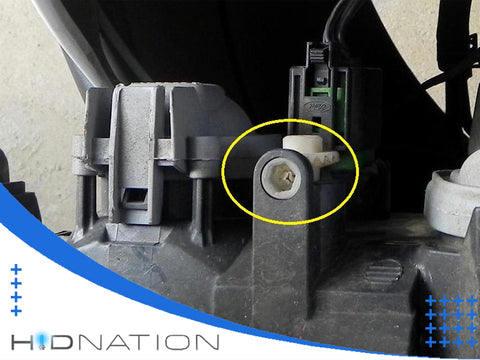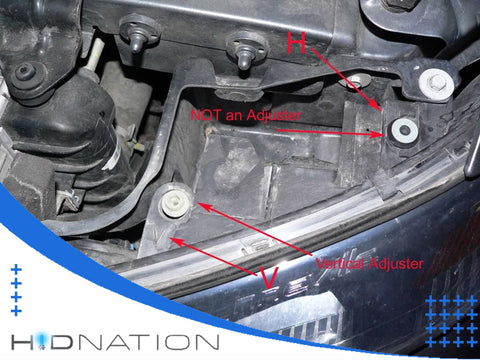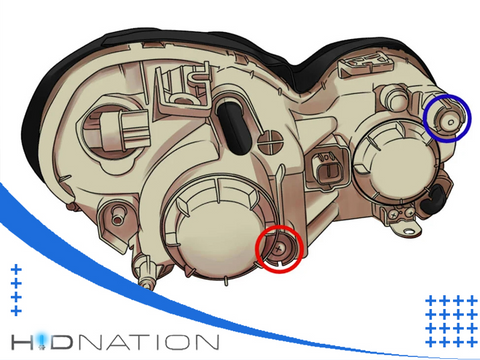Whether you're repairing your headlights or you simply want to adjust them, you'll need to know where to find the headlight adjustment screws. They are located near the lens cap in the center of the headlight lens.

#1. Fixing a faulty headlight adjustment screw
Depending on your car's make and model, you may be able to adjust your headlights independently. This can save you time and money. However, it is important to follow the manufacturer's specifications and guidelines. Some manufacturers may even recommend that you get professional help if you want to know where are the headlight adjustment screws?
● Internal componentsThe internal components of your headlights are attached to the housing with very delicate joints. These joints can break under a small amount of pressure. This can lead to low voltage and poor visibility at night. To prevent this, it is important to check your headlights for damage. Taking pictures of the headlights can help you put them back together correctly.
● Headlights stationaryYou may need to replace a headlight adjustment screw. These screws are designed to keep the headlights stationary. When the adjustment screw breaks, you may find that the headlights bounce, flutter, or are aimed in the wrong direction. You can replace the screw yourself or take it to a mechanic.
● An easy and simple processThe process is relatively simple and easy to do if you have moderate experience working with cars.
First, you need to locate the adjustment screws. Depending on the model of your car, these screws may be inside the plastic casing or on the top or side of the light housing. You can usually locate these screws using a Phillips screwdriver. If you can't locate the adjustment screw, you may need to remove the headlight from the car.
Next, you should measure the distance between the lights and a flat, level surface. So, this will give you a good idea of how close you need to be to adjust your headlights. Generally, you will need at least 25 feet of space to adjust your headlights properly.
When you find the correct screw, you should insert it into the headlight. The adjustment screw should be about the same width as the headlight. If you have a small car, you may have to tilt the headlight down to see the adjustment screw. Hence, it is recommended to use silicone lubricant to protect the screw from damage.
Read Also: How Much Does it Cost to Replace a Headlight?
● Testing the adjustment
You should also consider testing the adjustment. Many manufacturers recommend that you check your best led headlight bulbs on a dark road. This will allow you to see whether the adjustment was successful. But if not, you will need to adjust the headlights again until you have them aligned properly.
● Local auto partsAfter determining which adjustment screw you need to replace, you can head to your local auto parts store to purchase a new one. Most auto parts stores will have an assortment of screws that are appropriate for your car. You can also find screws for a variety of car makes online. However, you may need to contact the auto manufacturer to determine which screw is compatible with your car.
To reattach the headlight, you will need to bolt the headlight back onto the car's frame. Some manufacturers recommend removing the headlight wiring and coolant reservoir before doing this.

#2. Aligning your headlights – Step-by-step instructions
Whether your headlights are too bright, too low, or too dim, adjusting them will help you get a clear view of the road and other drivers. A good alignment will also help prevent you from shining your headlights into oncoming traffic.

Furthermore, you can do it yourself with just a few simple tools.
Step 1
First, you should mark your vehicle's center on a flat surface. You may need a carpenter's level for this. If you don't have a level, you can use painter's tape to mark the center line of your headlights. This will make it easier to determine the cutoff point. The cutoff line will be about two inches below the axis height.
Step 2
Now, you need to locate the adjusting screw on your headlights. This may be on the top of the light housing, on the side of the headlight housing, or at the bottom of the unit. You can buy a pair of headlight adjustment screws from your local auto parts store or purchase them online. They usually come with a plastic retaining shield to help keep them in place. You can also find instructions in your owner's manual for adjusting your headlights. You may also need a Phillips screwdriver.
Step 3
Once you have located the screw, you need to make a few adjustments. You will need to turn the side adjusting screw until the brightest spot is just to the right of the tape line. You should aim for the brightest spot two inches below the cross. So, for the main beam, you will need to aim for the brightest spot about 50 mm to the left of the horizontal tape line.
Step 4
Next, you will need to mark the vertical center line of your headlights. If you don't have a chart, you can measure the distance from your vehicle's centerline to the centerline of the wall. This can be a lot easier if you use painter's tape, which makes it easier to see the cutoff. You can also use a dry-erase marker to mark your vehicle's center.
Step 5When you have completed this step, you can test the alignment. To do this, you will need to park your car at a distance of about 25 feet away from the wall. You will also need to turn the lights off. This will help you aim. If your headlights do not line up correctly, you will need to repeat the process until they do. If they don't, you should take your car to a shop and have them help you adjust them.
In Addition, if you need help with adjusting your headlights, you can ask an assistant or a friend to help you. You can also take pictures of your headlights to put them back together properly.
Conclusion:Depending on the make and model of your car, you may need to remove the headlight from the car's body to reach the adjustment screws. Some vehicles may also have leveling bubbles to help you adjust your headlights. If you can't find the screws, you can always take your car to a mechanic for a replacement.



